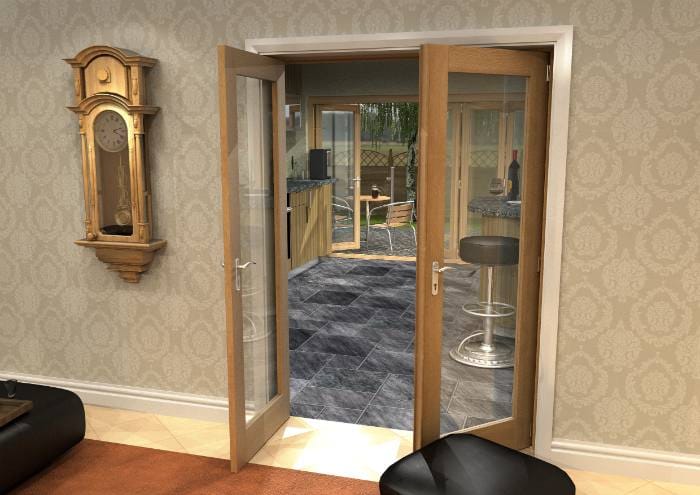
Almost immediately after glass became common in Europe, it was incorporated into doors, and for the most part, these doors came in a form that remains popular to this day. But what’s the definition of a French door? The French door is a classic type of double door, which most commonly opens outwardly and incorporates two or more glass panels.
External French doors are popular as a means of accessing a patio or garden. Internal French doors help open up the home, and disperse light around it.
Interiors come in many styles and arrangements – as do internal French doors. When you’re shopping for French style doors, you’ll want to select something to match your existing décor. Or, if you’re looking at redecorating, you might take the opposite approach – selecting the door that you most like the look of, and building the rest of your interior to match it.
Let’s talk more about what an internal French door is, and why you might choose one for your home.
As you might have guessed, French doors originated in France. They were invented in the 17th century, during a significant period of architectural innovation.
While not all French doors feature glass panels, historically this was their defining feature (and still is in the majority of French doors today).
So why do French doors have glass panels?
French doors were invented before electricity, so making the most of any natural light was pretty important. Those glass panels helped disperse sunlight around the home.
As above, glass is the defining feature of French doors. While you can get French doors without glass panels, some might argue that these aren’t French doors at all.
So for the sake of argument, let’s focus on French doors with glass panels.
Those glass panels can be arranged in many different ways – and it’s by changing this arrangement that the variety of different looks found in French doors can be achieved. For example, the ‘Aston’ style incorporates a trio of vertical glass panels, which run the length of the door. Other designs might consist of a single glass sheet which encompasses the entire face of the door, or horizontal and chequered patterns.
Some French doors, on the other hand, incorporate irregular shapes, like half-crescents, which are guaranteed to catch the eye.
As well as directly changing the appearance of the door, these differing styles will affect how much light can enter the room, and how spacious you perceive it to be.
The internal French doors we sell here at Aspire doors are made from engineered wood. Engineered wood is formed of different sheets of wood, pressed together and sandwiched between two faces.
Engineered wood is ideal for French doors, because engineered wood is significantly more resistant to warping than solid wood. This is because of the way that wood responds to changes in temperature and humidity over time.
In a solid wooden door, the wood will absorb moisture. This can cause it to expand slightly when it’s hot, and contract when it gets colder.
Over time, this warping effect can cause the door to change shape – and since the grain of the wood isn’t perfectly straight, the result will be a door that’s slightly crooked. In French doors, this might mean that the section of wood holding the glass in place falls away from it, causing draughts.
When the core of the door is formed of different lengths of wood placed next to each other, the warping effect will take place in many different directions at once, so the different planks of wood cancel one another out.
You can learn more about the difference between solid and engineered wooden doors in our blog post here.
Why else is engineered wood a good choice for internal French doors?
As well as being resistant to warping, engineered doors tend to be less expensive than their solid wood counterparts. By using cheaper wood in the door’s interior, and saving the more expensive wood for the exterior, it’s possible to save on materials without compromising the look of the finished product.
This needn’t suggest, however, that engineered doors cut back in terms of quality. Our engineered doors are substantial and weighty, and will last for many years to come.
Perhaps the biggest factor in how a door looks in your home is its finish. The finish is the coating that’s applied to the exterior of the door. It helps keep the wood’s moisture levels consistent, so your doors last longer.
Finishes for doors come in several forms – there are transparent coatings, like wax, which are designed to penetrate the wood, emphasising its natural grain and forming a protective barrier against water – preventing it from getting in or out. Then there are painted finishes which will change the colour of the door entirely.
You’ll find both styles of finish in our catalogue. That means you can install your door straight away, and looking immaculate from day one. We understand that every home is different and has unique requirements, so you might want to apply your own finish. Doing so couldn’t be easier – just select one of our unfinished doors, and paint it whichever colour you like.
French doors are perfect for dividing your living space without compromising on light distribution and that sense of space. They can be used to separate hallways from living rooms, and living rooms from kitchens, all while maintaining the sense that each room is part of the same home. If you’d like, you’ll be able to prop open your French doors permanently, to create a single living space – but if you’re considering doing this long-term, you might prefer to take a look at our folding and sliding interior doors too!